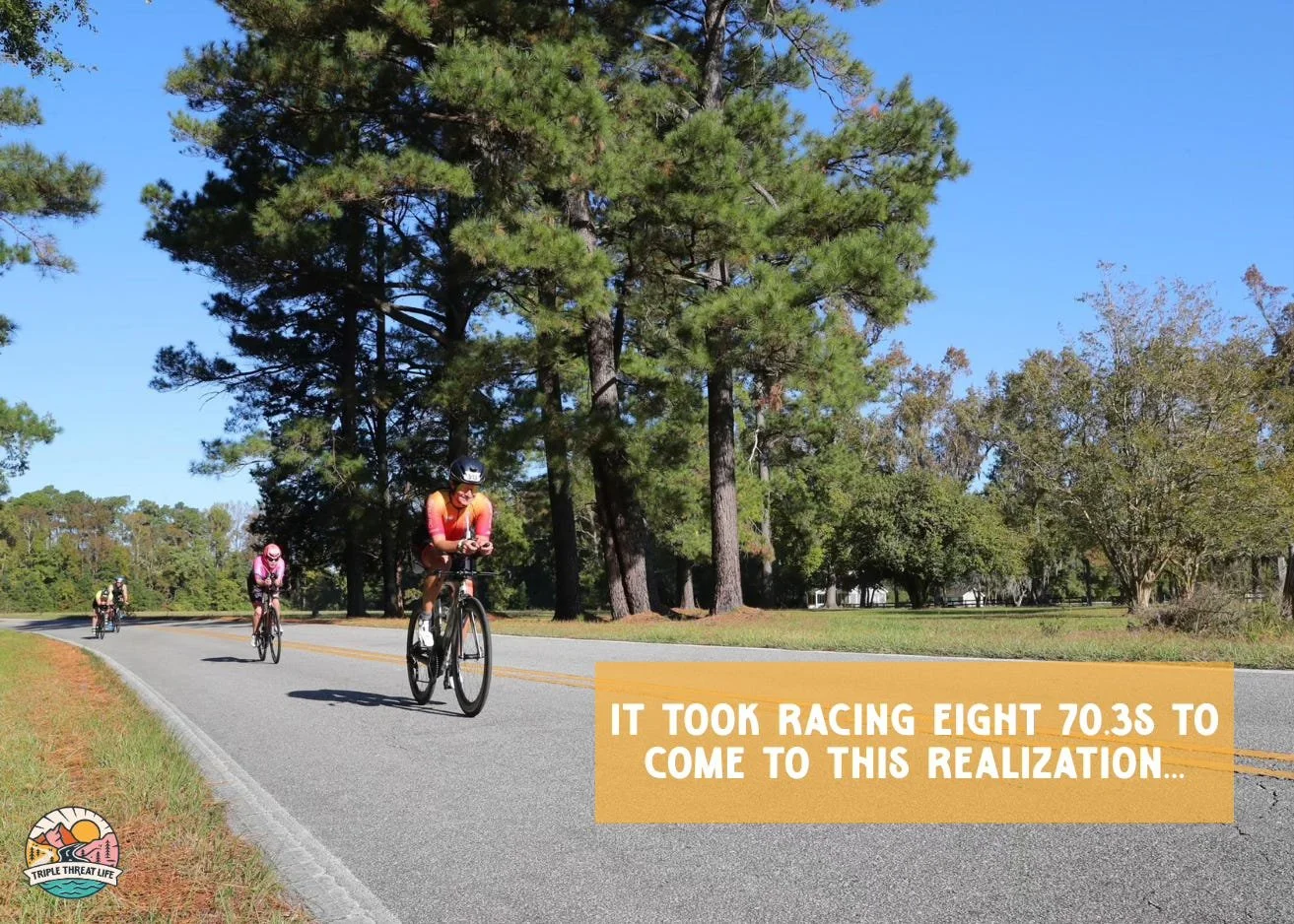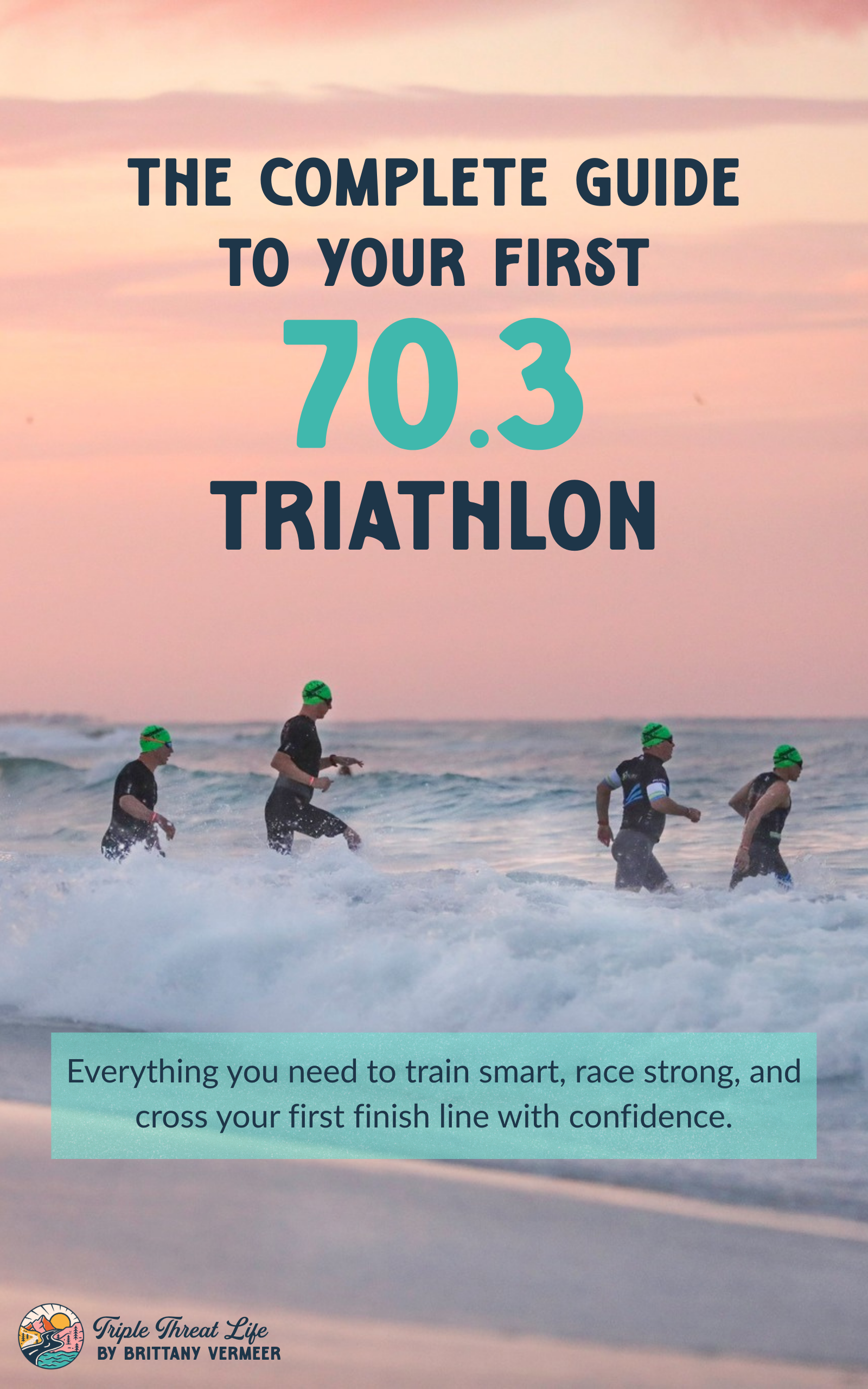It Took Racing Eight 70.3s to Come to This Realization
When you head into a big race, especially something as exciting as your first 70.3 triathlon, you probably have a few ideas about how it will go.
Many athletes simply wish to cover the distance. But you might also have expectations about pace, time, or placings. This way of thinking is dangerous…
When you focus more on the outcome of the race than the process, it can result in two different scenarios, neither of them good.
Best case scenario: Expectations serve as a distraction, preventing you from reaching your full potential, because you’re thinking about what happens after the race, instead of what you should be doing during the race.
Worst case scenario: Expectations cause stress, anxiety, and pressure to perform, which can be debilitating.
Is it wrong to have goals for a race?
Of course not. But, goals aren’t expectations…
Read on to discover how a simple mindset shift can unlock your performance potential by helping you race free of expectations.
Why expectations are different than goals
An athlete might say something like:
“I want to finish my 70.3 under 6 hours.”
“I should place in the top 15 of my age group.”
“I need to qualify for the World Championship.”
At first, these might sound like goals. But they’re really expectations, because the focus is solely on the outcome.
Goal
A goal is something you work toward.
It has a plan with steps to follow.
Goals are measurable and can guide your training choices, focus, and mindset.
Expectation
An expectation is something you believe will happen, often based on past experiences or assumptions.
Expectations focus on outcomes you can’t fully control.
It creates a standard to measure yourself against without giving you the tools to achieve it.
The Difference:
Goals direct your efforts.
Expectations demand results.
Here’s the secret- Simply expecting something is going to happen doesn’t increase the likelihood of it happening.
“Players may have goals, such as making the quarters; these are targets they hope to hit. In contrast, expectations are more hard lines of things that must happen; otherwise, it's a bad experience. When the outcome, such as winning or playing amazing and feeling great, become the expectation, the level of stress and anxiety increase and, more often than not, the player will be disappointed.”- Dr. Larry Lauer
Why no expectations doesn’t mean low expectations
My coach recently sent out her weekly newsletter. As soon as I read it, something clicked. It was GENIUS. I don’t know why I’d never thought of this before…
It’s something I wish I’d learned much sooner in my triathlon career.
So, I’m going to share it with you today.
Whether your next big race is a 70.3, Ironman, sprint, 10K, or marathon, I hope this mindset shift will help you have the best performance (and experience) possible.
Letting go of expectations doesn't mean lowering your standards—it means trusting your training, and feeding your love for the sport. The best athletes often race, not to prove something, but to discover something.- Marni Sumbal
When an athlete says they’re going into a race without any expectations, you might assume this means they don’t think they’ll have a good performance. That couldn’t be further from the truth.
This is because there’s a distinction between no expectations and low expectations.
Low expectations- You don’t have confidence in your abilities, missed some time during training, suffered an injury, ect. and expect the race will go poorly as a result.
High expectations- You have a standard to measure up against. This could be external (family, coach, peers) or internal (what you believe must happen).
No expectations- You go into a race without any assumptions about how the race will go. You have confidence in your preparation, abilities, and race with curiosity striving to have the best performance possible on the day.
Racing with no expectations helps us do a few things.
First, it eliminates unnecessary pressure. Instead of thinking about running a certain pace or having a good performance to justify the amount of time you spent preparing for the event, you’re free to focus on the processes that will help you have a good race. These are things like pacing, sticking with your nutrition plan, executing a streamline transition, focusing on run form, ect.
It also helps you stay focused on the task at hand. There’s a common saying in triathlon- “control the controllables.” That means focusing on the things you can control that will help you have a great race (form, pacing, mindset) instead of factors you can’t control (weather, course conditions, other athletes).
It removes the “expectation ceiling,” unlocking even greater performance. Just as expectations can cause you to feel discouraged when you don’t meet them, expectations can also put a ceiling on your perceived abilities.
Let’s say my husband, Matt, goes into a race expecting to run a 1:43 half marathon in a 70.3. That’s a 7’51 per mile average. During the race, he glances down at his watch a few times and sees paces in the 7’40s- 7’30s. Even if he feels great, he might back off, because the numbers don’t align with his expectation of how the run should go. He might think- “This is faster than I was expecting to run, so I’m not sure I can hold it.”
That’s an expectation ceiling, and it can change the way you race without you even realizing it. But by racing with no expectations, you become curious about what you can do. You might be more willing to take calculated risks, while listening to your body, which is how breakthrough performances happen on race day.
If you enjoyed this post, I cover topics like this in-depth in my new book- The Complete Guide to Your First 70.3 Triathlon!
It’s everything you need to take you from sign up to finish line so your first race isn’t a guessing game. Think of it as a shortcut to confidence, clarity, and finishing your first 70.3 strong.



